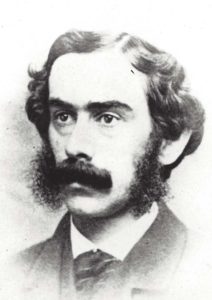Captain Miller and the “Arkansas Volunteers of African Descent”

Captain Lindley Miller
Which young Morristown Civil War hero carries $10,000 in cash to New Orleans for the Union forces along the Mississippi? It was Lindley Hoffman Miller (1834-1864), grandson of George and Louisa Macculloch, who was bound for duty in command of “colored troops,” organizing to fight in the Civil War. His personal letters home to his parents, Senator Jacob Welch Miller and mother, Mary Louisa, are among the family’s important historical documents in Macculloch Hall’s extensive archives.
By September 23rd, 1863, one of Macculloch Hall’s two Civil war heros, Lindley Hoffman Miller, received a letter from E.M. Hitchcock of Washington, D. C. Dated September 21st, the letter told him that, contrary to information in a letter sent two days earlier, there did exist a way for a well recommended young man of good character to join “…the fine body of officers for the colored regiments…”
This news set off a flurry of letters resulting in Lindley’s appointment to a posting by Adj. General Lorenzo Thomas. Thomas had been chosen by President Abraham Lincoln to oversee the selection, after his proclamation permitting African-American troops to take up arms in support of the cause.
By October 8th, Charles Tracy, father of Lindley’s recently deceased wife, Anne, had mobilized his brother, Frank Tracy, to write to General Thomas. On October 13th, a letter went to another general, Major General William B. Franklin. On October 14th, Lindley himself sent a carefully crafted letter featuring his experience “…in drilling and camp life…” with the New York 7th Regiment.
Meantime, letters from Cortlandt Parker, a lawyer and scion of a still prominent area family, and the Reverend Stephen H. Tyng went south to General Thomas.
By November 6th, Lorenzo Thomas returned a letter to Lindley Miller, affirming his appointment as a captain in the “…1st Regiment Arkansas Volunteers of African Descent.”
Lindley accepted in a letter dated November 19th, 1863, on the same day his mother, Mary Macculloch Miller, wrote to his younger brother, Jack, “…his heart is in the cause.”
Lindley also wrote to Jack, enclosing a stereopticon photograph of his wife, Annie Tracy. Annie’s and their baby son’s recent deaths (probably due to Annie’s hasty evacuation from New York City during the Draft Riots of July,) precipitated Lindley’s wish to join the fight.
Within days he was on his way to New Orleans with all that cash.

